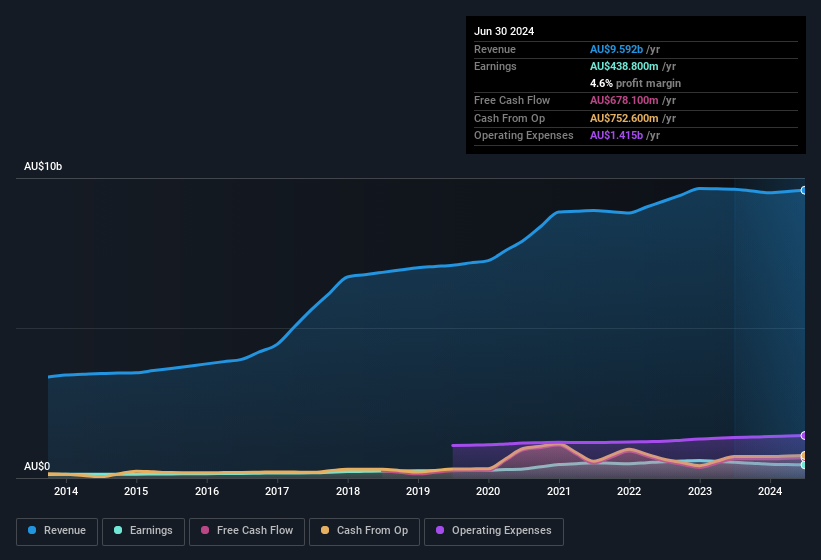- Australia
- /
- Specialty Stores
- /
- ASX:JBH
There May Be Reason For Hope In JB Hi-Fi's (ASX:JBH) Disappointing Earnings

JB Hi-Fi Limited's (ASX:JBH) recent soft profit numbers didn't appear to worry shareholders, as the stock price showed strength. Our analysis suggests that investors may have noticed some promising signs beyond the statutory profit figures.
See our latest analysis for JB Hi-Fi

Zooming In On JB Hi-Fi's Earnings
One key financial ratio used to measure how well a company converts its profit to free cash flow (FCF) is the accrual ratio. The accrual ratio subtracts the FCF from the profit for a given period, and divides the result by the average operating assets of the company over that time. The ratio shows us how much a company's profit exceeds its FCF.
As a result, a negative accrual ratio is a positive for the company, and a positive accrual ratio is a negative. While having an accrual ratio above zero is of little concern, we do think it's worth noting when a company has a relatively high accrual ratio. That's because some academic studies have suggested that high accruals ratios tend to lead to lower profit or less profit growth.
JB Hi-Fi has an accrual ratio of -0.19 for the year to June 2024. That indicates that its free cash flow quite significantly exceeded its statutory profit. To wit, it produced free cash flow of AU$678m during the period, dwarfing its reported profit of AU$438.8m. JB Hi-Fi's free cash flow improved over the last year, which is generally good to see.
That might leave you wondering what analysts are forecasting in terms of future profitability. Luckily, you can click here to see an interactive graph depicting future profitability, based on their estimates.
Our Take On JB Hi-Fi's Profit Performance
As we discussed above, JB Hi-Fi's accrual ratio indicates strong conversion of profit to free cash flow, which is a positive for the company. Based on this observation, we consider it possible that JB Hi-Fi's statutory profit actually understates its earnings potential! Unfortunately, though, its earnings per share actually fell back over the last year. Of course, we've only just scratched the surface when it comes to analysing its earnings; one could also consider margins, forecast growth, and return on investment, among other factors. If you want to do dive deeper into JB Hi-Fi, you'd also look into what risks it is currently facing. You'd be interested to know, that we found 1 warning sign for JB Hi-Fi and you'll want to know about this.
Today we've zoomed in on a single data point to better understand the nature of JB Hi-Fi's profit. But there is always more to discover if you are capable of focussing your mind on minutiae. For example, many people consider a high return on equity as an indication of favorable business economics, while others like to 'follow the money' and search out stocks that insiders are buying. While it might take a little research on your behalf, you may find this free collection of companies boasting high return on equity, or this list of stocks with significant insider holdings to be useful.
New: Manage All Your Stock Portfolios in One Place
We've created the ultimate portfolio companion for stock investors, and it's free.
• Connect an unlimited number of Portfolios and see your total in one currency
• Be alerted to new Warning Signs or Risks via email or mobile
• Track the Fair Value of your stocks
Have feedback on this article? Concerned about the content? Get in touch with us directly. Alternatively, email editorial-team (at) simplywallst.com.
This article by Simply Wall St is general in nature. We provide commentary based on historical data and analyst forecasts only using an unbiased methodology and our articles are not intended to be financial advice. It does not constitute a recommendation to buy or sell any stock, and does not take account of your objectives, or your financial situation. We aim to bring you long-term focused analysis driven by fundamental data. Note that our analysis may not factor in the latest price-sensitive company announcements or qualitative material. Simply Wall St has no position in any stocks mentioned.
About ASX:JBH
Flawless balance sheet with proven track record.
Similar Companies
Market Insights
Community Narratives





